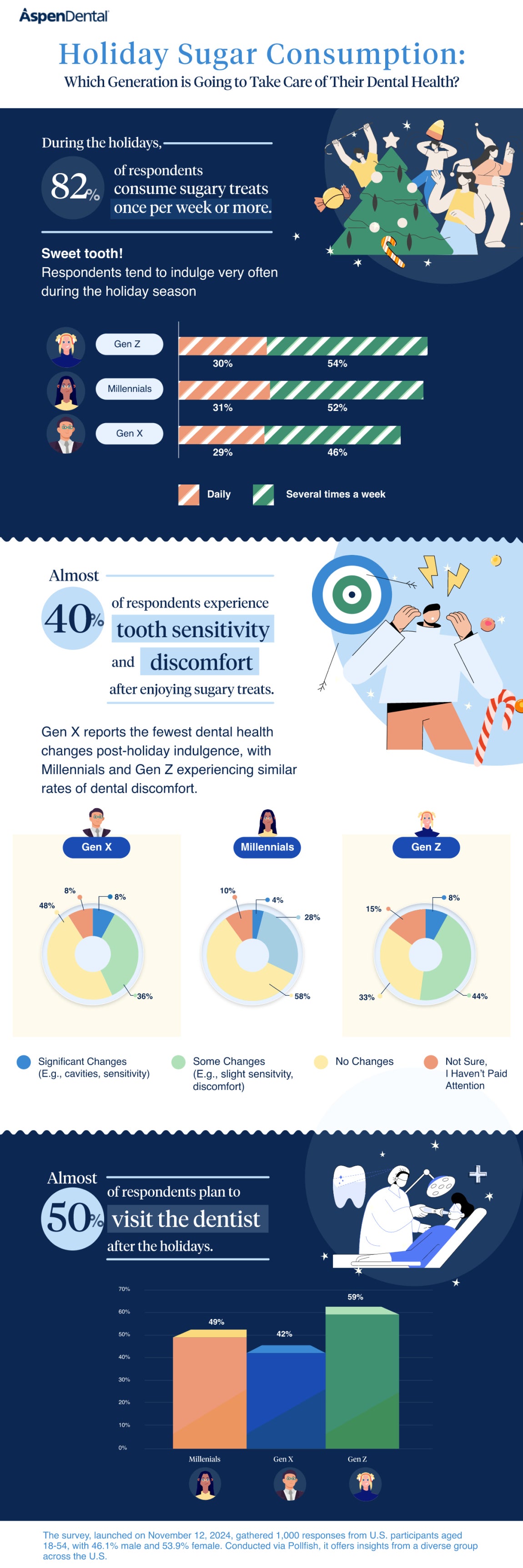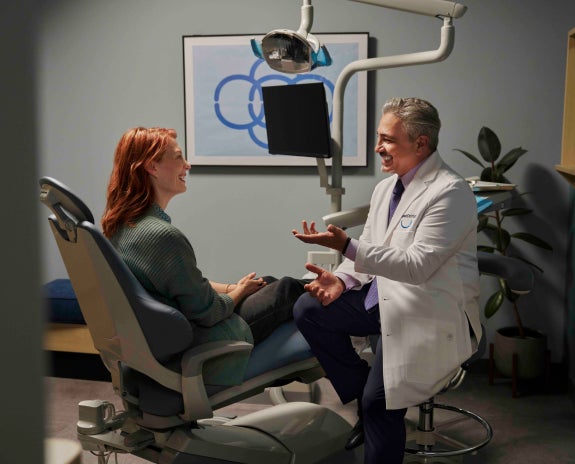Last updated 12.17.2024
The long-term impact of holiday treats on dental health
Learn how sugary snacks impact oral health and may lead to dental implants.

Anywhere you go during the holiday season, there’s likely to be an abundance of sweet treats. From easy-to-grab cookies and candies to holiday classics like fruitcake and figgy pudding, Americans are inundated with opportunities to indulge at the end of each year. But just how frequently are Americans enjoying sweets this time of year?
A recent survey of 1,000 people between the ages of 18 and 54 in the U.S. reveals that 82% of Americans reported consuming a sugary treat at least once a week during the holidays. While it’s common to enjoy sweets this time of year, too much sugar can lead to a negative long-term impact on your dental health, especially for the 30% of respondents who are daily consumers of sweets over the holiday season.

While a few sweets each week of the holiday season aren’t likely to cause severe dental problems, the long-term effects of daily sweet consumption can be significant if not paired with good oral hygiene habits. In this article, we’ll explore what holiday sweet habits, specifically those across generations, could mean for long-term oral health and ways to prioritize dental health during the holiday season.
Key takeaways on holiday treats and dental health
During the holidays, 82% of Americans consume sugary treats once per week or more.
Almost 40% of Americans have experienced changes in their oral health after enjoying sugary treats during the holidays, such as sensitivity and discomfort.
Generational preferences for holiday treats vary, with 18% of Gen Z respondents saying they prefer candy canes, nearly 20% of millennials choosing sugar cookies, and 19% of Gen X identifying caramel popcorn as their favorite treat.
Almost 50% of respondents plan to visit the dentist after the holidays.
More than 30% of Americans are somewhat or very likely to consider dental implants after indulging in sweets during the holiday season.

The link between sugary treats, tooth decay, and dental health during the holidays
With so much research now available, it’s hard to deny the correlation between sugar and tooth decay/cavities. In fact, intake of dietary sugars is the most important risk factor for dental cavities, according to the World Health Organization (WHO). Yet, despite the research, the holidays are a time of year when many people push healthy living to the wayside, to the wayside, pledging to pick back up with healthier habits starting January 1st.
Increased sugar consumption from food and drinks during the holidays can be combined with a propensity to neglect oral health routines thanks to late nights and holiday travel. In fact, nearly 40% of our survey respondents reported experiencing changes in their dental health after indulging in sugary treats, with many noticing sensitivity or discomfort. Despite these feelings, many people are still willing to indulge, with older generations showing a greater propensity for enjoying sweets daily or multiple times a week during the holiday season.
Generational differences in sugar consumption
Our survey revealed that sugar consumption habits vary across generations, with 29% of Gen Xers between 45 and 54 indulging in sugary snacks daily during the holiday season and 46% enjoying a treat several times a week. Though the Gen Z generation, ages 18 to 27, often get labeled as an environmentally conscious and healthy generation, our survey found they can’t resist a sweet treat during the holidays. Gen Z respondents were only slightly behind their Millennial counterparts (ages 28 to 44) when it came to daily sugar consumption, with a daily rate of indulgence of slightly over 30% for both groups. 54% of Gen Z will have a holiday treat several times a week, while Millennials came in at 52% for this cadence of eating.

Cavities: A hidden threat lurking behind holiday sugar consumption
If you’ve ever eaten too many sweets, you might have started to feel the physical effects. Nearly 40% of survey respondents reported feeling some or significant changes in dental health after holiday indulgences, which include sensitivity, discomfort, and gum issues.
Excess sugar can feed bacteria in the mouth, which can lead to tooth decay and, if teeth aren’t cared for properly, cavities. Luckily, your dental care team can help identify early signs of cavities and offer hygiene tips that may help you avoid getting a cavity.
Prioritizing dental health during the holiday season
Many people willingly acknowledge that they’re eating more treats than usual during the holidays, but some also commit to keeping dental health at the forefront of their minds. Over 30% of survey respondents said they occasionally or often modify holiday food choices due to concerns about dental health.
But if you aren’t willing to change what you eat, you can always prioritize healthy oral hygiene afterward. Almost 78% of respondents indicated they sometimes, often, or always make compromises, like eating sweets but brushing extra afterward.
The rush for post-holiday dental appointments
Almost 50% of survey respondents said they plan to visit a dentist by January 31st to address any lingering effects of holiday eating habits. At your appointment, your dental care team can help:
Identify early signs of cavities, plaque buildup, or tooth decay.
Recommend dental procedures, like a tooth filling, if necessary.
Re-establish healthy oral habits, like flossing daily (which 46% of survey respondents indicated they planned to do after the holidays!)
In severe cases where someone is missing a tooth or is experiencing decay to the point where the tooth must be extracted, the dentist may recommend a dental implant.

Dental implants: A solution for tooth loss, not healthy teeth
Indulging in sweet treats during the holidays won’t cause the need for a dental implant, but years of eating sugary foods without proper oral hygiene could increase the chances of needing intensive dental procedures later in life. It’s important to maintain proper oral care by brushing and flossing each day, along with visiting the dentist on a regular basis. Incorporating these oral care habits can help you avoid dental issues such as tooth loss.
Over 30% of survey respondents said that they are either somewhat or very likely to consider dental implants as a solution. However, it’s important to note that dental implants are recommended for missing teeth, and you should not get implants to replace healthy teeth.
Dental implants can be a long-term smile-saving solution when teeth are missing and oral health has dramatically declined. Schedule an appointment if you’re considering implants or want to learn more.

Your holiday treats and teeth: what’s next?
There is a way to enjoy the holiday season and all the deliciousness it has to offer without sacrificing your dental health. The important thing to remember is that letting sugar linger in your mouth, especially overnight, can cause the most damage.
Instead, stick to your healthy habits and be sure to brush twice daily and floss once. Focusing a few minutes a day on your dental health can keep you smiling for many holiday seasons to come.
If you’re experiencing tooth sensitivity or discomfort and are in need of a check-up, schedule an appointment today.
This survey was launched on November 12, 2024, using a third-party survey platform, Pollfish, and gathered 1,000 responses from a diverse group of participants in the U.S. between the ages of 18 to 54. Respondents were 46% male and 54% female. All respondents were located in the United States, offering insights into the American public’s sugar consumption habits and dental care awareness. The responses from the survey were post-stratified to ensure accuracy and representatives, adjusting for key demographic factors such as age, gender, and location, so the results more closely reflect the broader population's behaviors and attitudes. This process helps to mitigate any sampling biases and enhances the reliability of the findings.
Disclaimer: Dental health professionals strongly advise against removing healthy teeth for the purpose of getting implants. Natural teeth, when properly cared for, provide the best foundation for a healthy and functional smile. While dental implants are an excellent solution for replacing lost or damaged teeth, they are not a substitute for the strength and longevity of natural teeth. You can preserve your natural teeth for as long as possible by maintaining good oral hygiene and getting routine check-ups. Consult with your dentist if you have any questions about your dental health or are considering implants as a treatment option.



